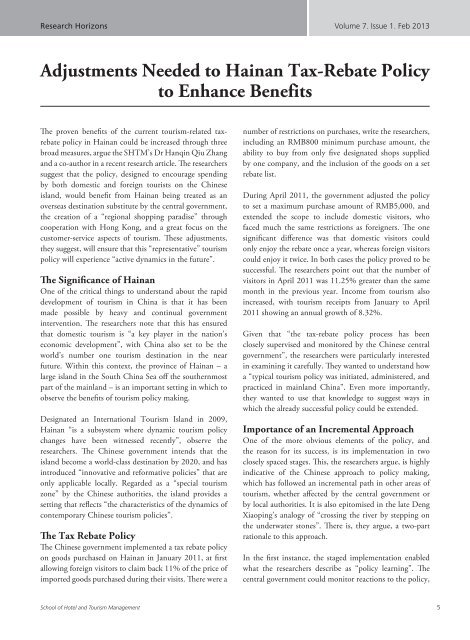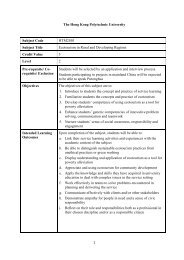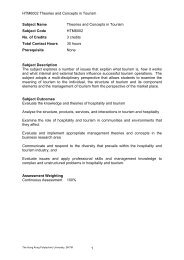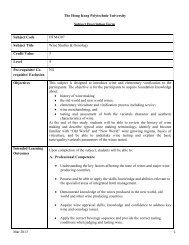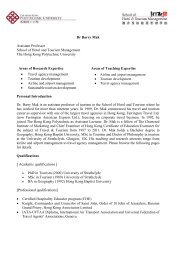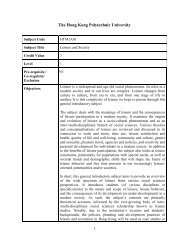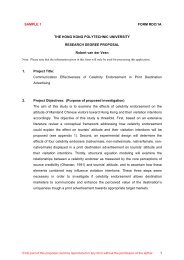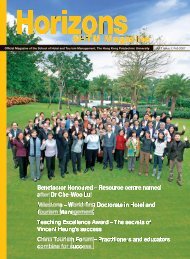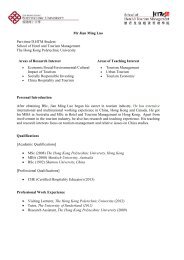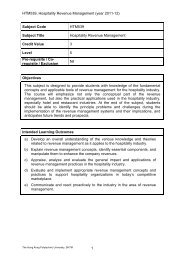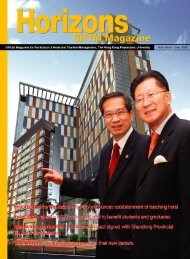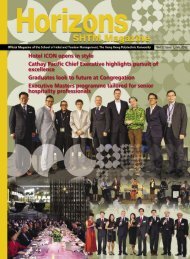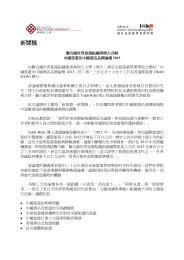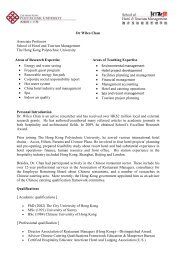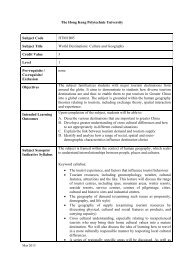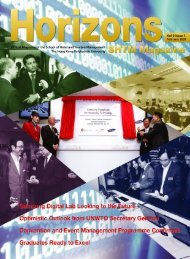Vol 13 Issue 1, February 2013 - School of Hotel & Tourism ...
Vol 13 Issue 1, February 2013 - School of Hotel & Tourism ...
Vol 13 Issue 1, February 2013 - School of Hotel & Tourism ...
Create successful ePaper yourself
Turn your PDF publications into a flip-book with our unique Google optimized e-Paper software.
Research Horizons <strong>Vol</strong>ume 7. <strong>Issue</strong> 1. Feb 20<strong>13</strong><br />
Adjustments Needed to Hainan Tax-Rebate Policy<br />
to Enhance Benefits<br />
The proven benefits <strong>of</strong> the current tourism-related taxrebate<br />
policy in Hainan could be increased through three<br />
broad measures, argue the SHTM’s Dr Hanqin Qiu Zhang<br />
and a co-author in a recent research article. The researchers<br />
suggest that the policy, designed to encourage spending<br />
by both domestic and foreign tourists on the Chinese<br />
island, would benefit from Hainan being treated as an<br />
overseas destination substitute by the central government,<br />
the creation <strong>of</strong> a “regional shopping paradise” through<br />
cooperation with Hong Kong, and a great focus on the<br />
customer-service aspects <strong>of</strong> tourism. These adjustments,<br />
they suggest, will ensure that this “representative” tourism<br />
policy will experience “active dynamics in the future”.<br />
The Significance <strong>of</strong> Hainan<br />
One <strong>of</strong> the critical things to understand about the rapid<br />
development <strong>of</strong> tourism in China is that it has been<br />
made possible by heavy and continual government<br />
intervention. The researchers note that this has ensured<br />
that domestic tourism is “a key player in the nation’s<br />
economic development”, with China also set to be the<br />
world’s number one tourism destination in the near<br />
future. Within this context, the province <strong>of</strong> Hainan – a<br />
large island in the South China Sea <strong>of</strong>f the southernmost<br />
part <strong>of</strong> the mainland – is an important setting in which to<br />
observe the benefits <strong>of</strong> tourism policy making.<br />
Designated an International <strong>Tourism</strong> Island in 2009,<br />
Hainan “is a subsystem where dynamic tourism policy<br />
changes have been witnessed recently”, observe the<br />
researchers. The Chinese government intends that the<br />
island become a world-class destination by 2020, and has<br />
introduced “innovative and reformative policies” that are<br />
only applicable locally. Regarded as a “special tourism<br />
zone” by the Chinese authorities, the island provides a<br />
setting that reflects “the characteristics <strong>of</strong> the dynamics <strong>of</strong><br />
contemporary Chinese tourism policies”.<br />
The Tax Rebate Policy<br />
The Chinese government implemented a tax rebate policy<br />
on goods purchased on Hainan in January 2011, at first<br />
allowing foreign visitors to claim back 11% <strong>of</strong> the price <strong>of</strong><br />
imported goods purchased during their visits. There were a<br />
number <strong>of</strong> restrictions on purchases, write the researchers,<br />
including an RMB800 minimum purchase amount, the<br />
ability to buy from only five designated shops supplied<br />
by one company, and the inclusion <strong>of</strong> the goods on a set<br />
rebate list.<br />
During April 2011, the government adjusted the policy<br />
to set a maximum purchase amount <strong>of</strong> RMB5,000, and<br />
extended the scope to include domestic visitors, who<br />
faced much the same restrictions as foreigners. The one<br />
significant difference was that domestic visitors could<br />
only enjoy the rebate once a year, whereas foreign visitors<br />
could enjoy it twice. In both cases the policy proved to be<br />
successful. The researchers point out that the number <strong>of</strong><br />
visitors in April 2011 was 11.25% greater than the same<br />
month in the previous year. Income from tourism also<br />
increased, with tourism receipts from January to April<br />
2011 showing an annual growth <strong>of</strong> 8.32%.<br />
Given that “the tax-rebate policy process has been<br />
closely supervised and monitored by the Chinese central<br />
government”, the researchers were particularly interested<br />
in examining it carefully. They wanted to understand how<br />
a “typical tourism policy was initiated, administered, and<br />
practiced in mainland China”. Even more importantly,<br />
they wanted to use that knowledge to suggest ways in<br />
which the already successful policy could be extended.<br />
Importance <strong>of</strong> an Incremental Approach<br />
One <strong>of</strong> the more obvious elements <strong>of</strong> the policy, and<br />
the reason for its success, is its implementation in two<br />
closely spaced stages. This, the researchers argue, is highly<br />
indicative <strong>of</strong> the Chinese approach to policy making,<br />
which has followed an incremental path in other areas <strong>of</strong><br />
tourism, whether affected by the central government or<br />
by local authorities. It is also epitomised in the late Deng<br />
Xiaoping’s analogy <strong>of</strong> “crossing the river by stepping on<br />
the underwater stones”. There is, they argue, a two-part<br />
rationale to this approach.<br />
In the first instance, the staged implementation enabled<br />
what the researchers describe as “policy learning”. The<br />
central government could monitor reactions to the policy,<br />
<strong>School</strong> <strong>of</strong> <strong>Hotel</strong> and <strong>Tourism</strong> Management 5


